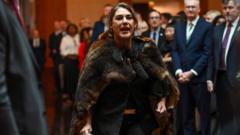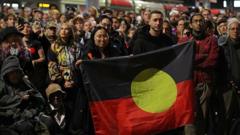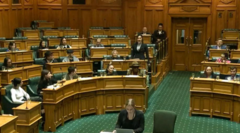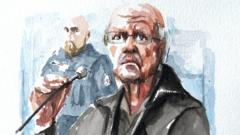The censure highlights ongoing tensions surrounding Indigenous rights and the legacy of colonization in Australia.
Senator Lidia Thorpe Censured for Heckling King Charles during His Visit to Canberra

Senator Lidia Thorpe Censured for Heckling King Charles during His Visit to Canberra
Australian lawmakers express disapproval of Senator Thorpe's protest against the monarchy.
In a notably contentious display of dissent, Australian Senator Lidia Thorpe has been formally censured by lawmakers for heckling King Charles during his recent visit to Canberra. The protest occurred in the Great Hall of Parliament, where Thorpe loudly declared, "you are not my King" and "this is not your land", aiming to spotlight the lasting impacts of British colonization on Indigenous peoples. The Senate vote, which resulted in a 46-12 margin, labeled Thorpe’s actions as “disrespectful and disruptive,” recommending that her behavior disqualifies her from representing the chamber in any official delegation.
Although the censure holds no legal weight, it serves as a political rebuke. In her defense, Thorpe asserted that a delayed flight had prevented her from addressing the Senate directly about her actions. “The British Crown committed heinous crimes against the first peoples of this country... I will not be silent,” she stated afterward. The response to her protest was mixed, drawing criticism from various political leaders and even some Aboriginal representatives, while others praised her for bringing attention to the struggles faced by Australia's first inhabitants.
During the King’s five-day tour, he received a warm reception from Australian crowds. Prime Minister Anthony Albanese recognized the King's efforts and the respect shown towards Australians, notwithstanding ongoing debates about the country’s constitutional future and its relationship with the monarchy. Thorpe's history of advocacy for Indigenous issues has been complex, previously making headlines for characterizing Queen Elizabeth II as a colonizer during her swearing-in ceremony in 2022, which led to her retaking the oath amid backlash.
The recent referendum aimed at granting constitutional recognition to Aboriginal and Torres Strait Islander peoples, known as "The Voice", was met with decisive rejection last year, deepening the uncertainty surrounding Indigenous policy in Australia. Despite polling suggesting that many Indigenous Australians favored a 'Yes' vote, support was not universal, and Thorpe publicly campaigned against the measure, labeling it as merely symbolic, raising questions about the future of Indigenous rights and recognition in the nation.
Although the censure holds no legal weight, it serves as a political rebuke. In her defense, Thorpe asserted that a delayed flight had prevented her from addressing the Senate directly about her actions. “The British Crown committed heinous crimes against the first peoples of this country... I will not be silent,” she stated afterward. The response to her protest was mixed, drawing criticism from various political leaders and even some Aboriginal representatives, while others praised her for bringing attention to the struggles faced by Australia's first inhabitants.
During the King’s five-day tour, he received a warm reception from Australian crowds. Prime Minister Anthony Albanese recognized the King's efforts and the respect shown towards Australians, notwithstanding ongoing debates about the country’s constitutional future and its relationship with the monarchy. Thorpe's history of advocacy for Indigenous issues has been complex, previously making headlines for characterizing Queen Elizabeth II as a colonizer during her swearing-in ceremony in 2022, which led to her retaking the oath amid backlash.
The recent referendum aimed at granting constitutional recognition to Aboriginal and Torres Strait Islander peoples, known as "The Voice", was met with decisive rejection last year, deepening the uncertainty surrounding Indigenous policy in Australia. Despite polling suggesting that many Indigenous Australians favored a 'Yes' vote, support was not universal, and Thorpe publicly campaigned against the measure, labeling it as merely symbolic, raising questions about the future of Indigenous rights and recognition in the nation.





















